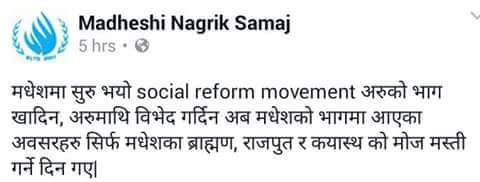Response to criticism on ‘We Are Sorry’ campaign for social reform


A few friends have criticised the apology campaign – and alleged it is a ploy to earn ‘cheap popularity’; that it is not substantive; that it is funded; that it is a conspiracy of the state to divide the Madhes movement on caste lines by using Madhesi faces (criticism in the images above).
Here are the responses to the criticism on the campaign, by Journalist Prashant Jha, Tula Narayan Shah and Dipendra Jha among those campaign initiators.
Prashant writes:
Let us consider these one by one.
First – to suggest that this is a plot of the state, and we are all playing to Oli’s tune, is bizarre. You just look at the track record of people who have participated in the campaign – they have challenged the state, particularly this regime, at every turn. I am afraid this is a product of the deep seated conspiracy thinking that seems to have taken roots in Nepali public discourse. You take on the state, and you must be an Indian agent. You speak about internal discrimination in Madhes, and you must be a pahadi agent. Let us move away from this kind of illiterate and baseless framing which doesn’t tell you anything.
Second, for those friends who worry about how this will divide Madhesi society, I would like to suggest that this will in fact strengthen Madhesi society and the movement. Society is already divided on caste lines – look at Madhesi parties, Madhesi media, Madhesi civil society organisations; go to Madhes’ villages, and it is so obvious that discrimination and under-representation persists. This is an effort to recognise the problem so that we start making efforts to address it.
This does not mean that our collective movement against Kathmandu will no longer be a priority. I said in my initial note last week – political liberation and social reform must go together. Our focus is challenging the Kathmandu regime and our demand is immediate constitutional
Amendment. Unless the constitution is amended to address four broad issues – federal demarcation, upper house representation, citizenship (to ensure gender equality) and ensure inclusion – Madhes will not own this constitution. It will not cooperate in implementing this constitution. The anger and alienation will only deepen and our distance from the existing Nepali state will grow. But even as that happens, let us initiate internal correctives.
Another campaigner Tula Narayan Sah writes on his facebook clarifying that the apology campaign has not been started with political ambition, and the campaigners does not have any intention to join politics. Needless to mention, politics is the main issue of Madhes. To say this, we cannot avoid social issue. The campaign does not aim to sideline the movement, but it will ultimately facilitate the ongoing political movement. Let’s fight together against caste, gender, and religious discrimination and other injustice.

And finally, as Dipendra Jha pointed out, we recognise this is a small step. It does not compensate for h istoric injustice. The apology has to be followed by action – in terms of how we engage with members of other communities, whether we abide by principles of diversity in our institutions, whether we support their struggles in real terms. This campaign is no substitute for their own assertion. I am not a woolly headed to think that an apology will result in change in the distribution of power within Tarai. It is also deeply patronising to think that. And that is why an assertive Dalit movement, women’s movement, Muslim movement, Tharu movement are all essential to claim rights – we will all support their demands.
istoric injustice. The apology has to be followed by action – in terms of how we engage with members of other communities, whether we abide by principles of diversity in our institutions, whether we support their struggles in real terms. This campaign is no substitute for their own assertion. I am not a woolly headed to think that an apology will result in change in the distribution of power within Tarai. It is also deeply patronising to think that. And that is why an assertive Dalit movement, women’s movement, Muslim movement, Tharu movement are all essential to claim rights – we will all support their demands.
And no, none of us here want to win any popularity contests. If we did, we would not have taken up many of the battles that we have – with Kathmandu, and with the conservative elements of Madhesi society. This charge is too frivolous to demand a response!
And of course, this is all entirely voluntary. Kathmandu’s donor dominated culture makes people think every campaign is funded! Come on guys, don’t look for conspiracies when none exist. Let us be constructive and think about what else can be done on both fronts – the larger movement to force amendments and internal reform. This is a collective movement.



